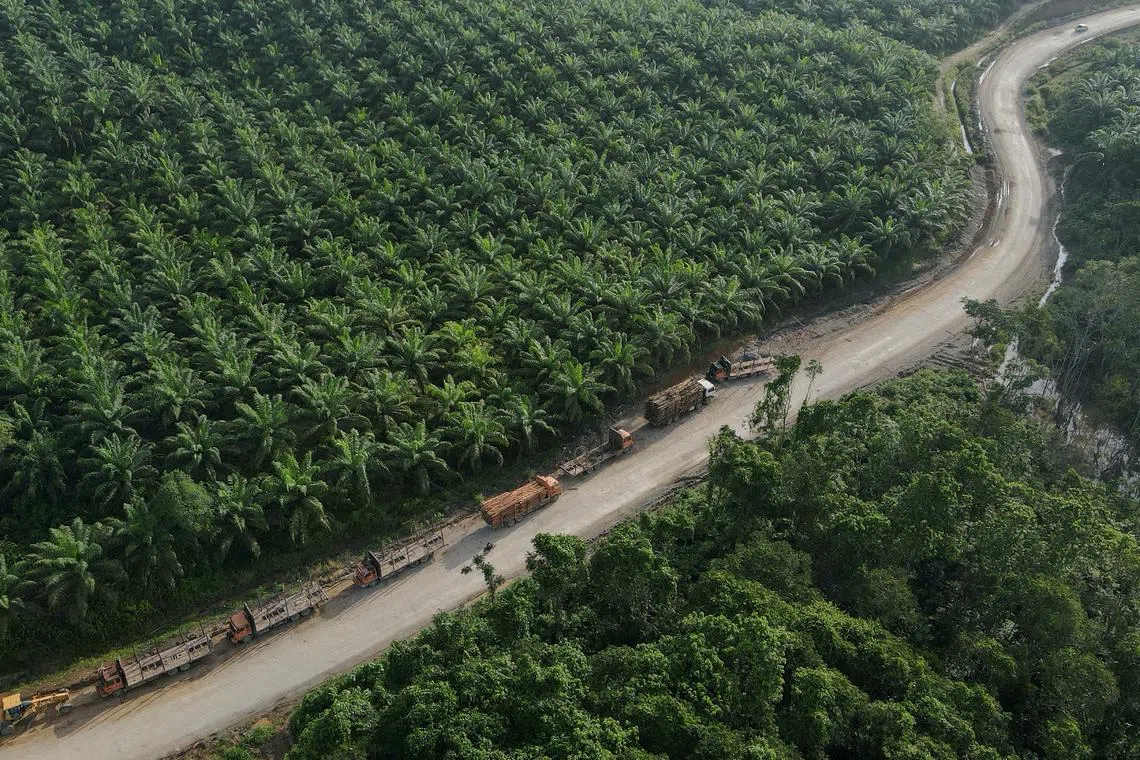Indonesia accuses EU of ‘regulatory imperialism’ with deforestation law
Sign up now: Get insights on Asia's fast-moving developments

Indonesia is the world’s biggest palm oil exporter and a major global supplier of coffee, cocoa, rubber and timber products.
PHOTO: REUTERS
Follow topic:
JAKARTA - Indonesia sees the European Union as conducting “regulatory imperialism” with its new deforestation law,
South-east Asia’s biggest economy will continue negotiations for a Comprehensive Economic Partnership Agreement (CEPA) with the bloc, alongside separate consultations to resolve disputes on the EU’s deforestation rules, Mr Airlangga Hartarto, Indonesia’s Coordinating Economic Minister, told Reuters.
Jakarta wants to close a deal on the free trade agreement (FTA) soon after seven years of deliberations, he said, but stressed Indonesia “can wait another seven years” if the EU was unwilling to recognise existing export standards, like those on sustainable palm oil and wood products, under the deforestation rules.
“We’re discussing trade facilitation... But in parallel, they’re building walls. This is not fair,” said Mr Airlangga, who raised the issue in Brussels last week together with Malaysia’s deputy prime minister.
Mr Airlangga cited ongoing disputes with the EU, including its complaint at the World Trade Organisation (WTO) over Indonesia’s nickel ore export ban and a separate WTO case that Indonesia filed over the EU’s phasing out of palm oil as biofuels’ feedstock.
The bloc’s carbon tax plans could also hit Indonesian nickel products, Mr Airlangga said, describing EU rules as “regulatory imperialism”.
A European Commission spokesman said the EU was aware of the deforestation law concerns and assured that the rules would not be discriminatory or used as disguised trade restrictions.
“The CEPA with Indonesia will include a platform for cooperation on shared challenges such as deforestation,” the spokesman said, adding that negotiations were scheduled for July.
Malaysia has said the dispute over the EU law will have no bearing on its stalled European Union FTA negotiations.
Big impact
The law, passed by the European Parliament in April, bans EU imports of a range of commodities linked to forest destruction. Indonesia has the world’s third-largest area of rainforest.
It is also the world’s biggest palm oil exporter and a major global supplier of coffee, cocoa, rubber and timber products. About €6 billion (S$8.7 billion) of its annual exports will be affected by the deforestation law, Mr Airlangga said.
Indonesia argues that the law will hurt small oil palm farmers, hampering efforts to reach its sustainable development goals, as farmers will struggle to comply with geolocation rules. It also fears that being labelled as a “high risk” country could lead to more costly inspections for its products.
The government has said the rate of deforestation has declined, but environmentalists say some farmers and companies still clear forests for oil palm cultivation.
Indonesia is also among the world’s top 10 biggest carbon emitters, largely due to forest and peatland clearance.
Separately, Mr Airlangga said Indonesia has also proposed for the US-led Indo-Pacific Economic Framework to include a trade agreement on critical minerals, so companies operating in Indonesia can benefit from US tax credits.
That proposal, which he said had been endorsed by other South-east Asian countries and Australia, came after Indonesia said it would propose a limited FTA with the US covering battery materials. REUTERS

